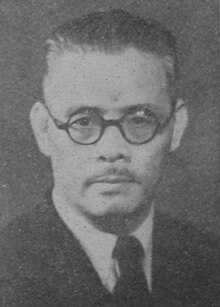Zhang Xiruo (Chinese: 张奚若; October 1889 – 18 July 1973), courtesy name Xiruo, art name Yun, was a Chinese politician who served as Minister of Education from 1952 to 1958 and director of the Foreign Cultural Liaison Committee from 1959 to 1968.
Zhang Xiruo | |||||||
|---|---|---|---|---|---|---|---|
张奚若 | |||||||
 Zhang Xiruo | |||||||
| Director of the Foreign Cultural Liaison Committee | |||||||
| In office April 1959 – 1968 | |||||||
| Premier | Zhou Enlai | ||||||
| Preceded by | New title | ||||||
| Succeeded by | Huang Zhen | ||||||
| Minister of Education | |||||||
| In office 15 November 1952 – 11 February 1958 | |||||||
| Premier | Zhou Enlai | ||||||
| Preceded by | Ma Xulun | ||||||
| Succeeded by | Yang Xiufeng | ||||||
| Personal details | |||||||
| Born | 1889 Chaoyi County, Shaanxi, Qing China | ||||||
| Died | July 18, 1973 (aged 83) Beijing, China | ||||||
| Political party | Tongmenghui | ||||||
| Spouse | Yang Jingren | ||||||
| Children | Zhang Wenpu | ||||||
| Alma mater | Columbia University | ||||||
| Chinese name | |||||||
| Simplified Chinese | 张奚若 | ||||||
| Traditional Chinese | 張奚若 | ||||||
| |||||||
| Xiruo | |||||||
| Chinese | 熙若 | ||||||
| |||||||
| Yun | |||||||
| Chinese | 耘 | ||||||
| |||||||
Zhang was a delegate to the 1st, 2nd, 3rd, and 4th National People's Congress. He was a member of the Standing Committee of the 1st, 2nd, 3rd, and 4th Chinese People's Political Consultative Conference.
Biography
editZhang was born into a family that owned a pharmacy in Chaoyi County (now Zhaoyi Town), Shaanxi, in October 1889.[1][2] At the age of 18, he attended Hongdao Academy, one of the earliest modern schools established in Shaanxi, where he studied alongside Wu Mi.[1] One year later, he led and organized a student movement, drove away two Japanese teachers, and was forced to flee to Shanghai.[1] He joined the Tongmenghui and took part in the Xinhai Revolution.[1][2] In 1913, he pursued advanced studies in the United States, obtaining a master's degree in political science from Columbia University in 1919.[1][2]
Zhang returned to China in 1925 and successively worked as director of the International Publication Exchange Bureau, director of the Higher Education Department of the Ministry of Education, and professor at National Central University.[1] In August 1929, he was recruited as a professor in the Department of Political Science, Tsinghua University.[1]
In June 1949, Zhang was appointed as deputy director of the newly established North China Higher Education Commission. On 21 June 1949, during the first meeting of the preparatory committee for the Chinese People's Political Consultative Conference (CPPCC), when discussing the name of the new China, he proposed using the name "People's Republic of China".[2] On September 27, the first plenary session of the CPPCC adopted the new name proposed by him and included it in the Common Program of the CPPCC.[2] In December 1949, he became president of the Chinese People's Diplomatic Association, in which he made positive contributions in promoting the establishment of diplomatic relations between China, France, and Japan.[1] In September 1952, he succeeded Ma Xulun as minister of education.[1] During his term in office, he presided over patriotic education, civic education, and labor education, improved the curriculum and school system, promoted students to speak Mandarin, and formulated the "Code of Conduct for Primary School Students". In 1956, at a "study conference", he emphasized that "shouting 'Long live' is the decline of human civilization." (喊‘万岁’,这是人类文明的堕落).[3] In 1957, the Central Committee of the Chinese Communist Party launched the "Rectification Movement", he gave Mao Zedong an evaluation: "Great achievements, eager for quick success, disdainful of the past, superstitious about the future." (好大喜功,急功近利,鄙视既往,迷信将来)[3][4] He also said: "Nowadays, it seems that everything starts after liberation of China. In the past, everything was feudal, and before Karl Marx was born, humanity had no culture."[1] Although Mao was dissatisfied with Zhang's criticism, but he believed that Zhang was a good person.[3][4] In April 1959, he was chosen as director of the Foreign Cultural Liaison Committee, and served until 1968.[1]
In August 1966, during the Cultural Revolution, Zhang was protected by Zhou Enlai and did not face political persecution.[2]
Zhang died in Beijing on 18 July 1973, at the age of 84.[2]
Publications
edit- 张奚若文集 [Collected Works of Zhang Xiruo] (in Chinese). Beijing: Tsinghua University Press. 1989. ISBN 9787302005049.
Family
editZhang married Yang Jingren (杨景任).[1] They son, Zhang Wenpu, served as Chinese Ambassador to Canada from 1986 to 1990.[1]
References
edit- ^ a b c d e f g h i j k l m 棱角先生张奚若(图). sina (in Chinese). 19 February 2013. Retrieved 8 April 2024.
(68岁的张奚若说得很尖锐:"八年来的成绩是基本的,但缺点也是严重的。某些人在工作中好大喜功,什么事都喜欢大,大则大矣,适用与否,却是不管的";"好大喜功的原因,客气一点说是由于幼稚,比如小孩子要苹果总是要大的,不管好吃不好吃";"一切都要速成,要快,说什么向科学进军,做学问的事情,没有那么简单";"现在好像是什么东西都是解放以后算起,以前什么都是封建,在打倒之列,好像马克思出生之前,人类就没有文化似的。")
- ^ a b c d e f g Wang Chuguang (王楚光) (17 October 2018). “中华人民共和国”国名提议者张奚若的晚年. guancha.cn (in Chinese). Retrieved 8 April 2024.
- ^ a b c Shi Feixiang (史飞翔) (18 July 2013). “硬人”张奚若. people.com.cn (in Chinese). Retrieved 8 April 2024.
- ^ a b 陈铭枢张奚若说毛泽东"好大喜功"的历史真相. ifeng.com (in Chinese). 18 May 2008. Retrieved 8 April 2024.